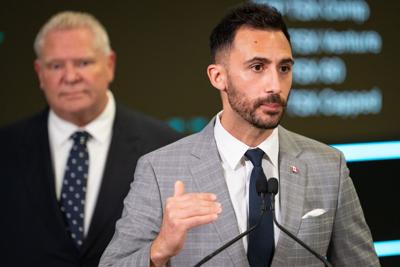Scrambling to allay concerns from Indigenous leaders, Premier Doug Ford’s Progressive Conservatives concede they will have to make changes to a controversial law fast-tracking mining projects.
Energy and Mines Minister Stephen Lecce said Monday the government is mindful that Bill 5, the “Protect Ontario by Unleashing Our Economy Act,” which is now being studied by a legislative committee at Queen’s Park, could be better.
“We can continue to work in good faith with First Nation leaders to strengthen the bill, to get it right. We’re open to making those improvements to the bill. We already have made some, but I think there’s some more work to do,” Lecce told reporters.
“We’re going to have those discussions with the First Nation leaders — we have throughout the weekend to be fair — and beyond, but I’m just signalling to you a willingness to do that,” he said.
Lecce would not specify what amendments the Tories were considering for Bill 5, which would limit environmental assessments, create “special economic zones” exempt from many municipal and provincial rules while violating long-standing First Nation treaty rights and potentially endangering wildlife.
NDP Leader Marit Stiles was skeptical that his pledge to modify the legislation could fix it.
“Go back to the drawing board,” she urged. “This fight will end up in the courts or on the land.”
Indeed, that could mean “blockages of mines, roads,” warned New Democrat MPP Sol Mamakwa (Kiiwetinoong), whose northwestern Ontario riding include the vast Ring of Fire mineral deposits.
“That’s the only way that they’ll listen,” Mamakwa said of Ford’s government.
Grand Chief Alvin Fiddler of the Nishnawbe Aski Nation said the premier’s comment last Friday that reluctant First Nations would eventually come on board once they see others enjoying economic benefits such as electricity lines from Bill 5 was “an idiotic thing to say.”
First Nations will do “anything and everything that will make this government listen to us,” said Fiddler, hinting at the prospect of “conflict on the ground.”
“If this bill in its current form goes through, that is where we’re heading,” he said. “And those that oppose (Bill 5) will most likely end up in jail.”
Other Indigenous leaders took exception to Ford touting the legislation is a way for them to get electricity, training, jobs and other modern conveniences.
“Really, all they’re doing is using the neglect of these nations for the past 150 years as, somehow, leverage to open the doors,” said Scott McLeod, regional chief for the Anishinabek nation.
“These things should have been done a long time ago.”
Liberal Leader Bonnie Crombie said the Tories are overreaching with Bill 5.
“I have a lot of issues with the power that it grants to cabinet, with respect to the special economic zones, the trusted proponents, who might they be and who would qualify, and then, of course, the lack of consultation with Indigenous communities with respect to Ring of Fire and other Northern development issues,” said Crombie.
 “The problem is the premier is ignoring Indigenous communities and plowing ahead … and I think there could be a big fallout as a result.”
Green Party Leader Mike Schreiner said Bill 5 is an “extraordinary power grab by the premier,” who has used the American president’s tariffs on Canadian goods as justification.
“If you want to fight Donald Trump, you can’t act like Donald Trump,” said Schreiner.
But Indigenous Affairs and First Nations Economic Reconciliation Minister Greg Rickford, who spent the weekend meeting with chiefs from across the province, said the legislation is about improving opportunities for remote communities.
“We’ve had a robust political engagement with a number of chiefs around consensus items. When we talk about the opportunity that an economic zone presents, it’s really about a convergence of objectives that we share,” Rickford, who worked as a nurse on First Nation reserves before he went into politics.
“These communities have no road access in a shrinking winter road season. They’re on diesel (power) generation,” he said.
“I’ll say to sum up that a number of chiefs that I’ve talked to think we have a lot of room to move here. There is no question in any part of the province that First Nations communities have historically been at a disadvantage when major economic projects move forward.”
Error! Sorry, there was an error processing your request.
There was a problem with the recaptcha. Please try again.
You may unsubscribe at any time. By signing up, you agree to our and . This site is protected by reCAPTCHA and the Google and apply.
Want more of the latest from us? Sign up for more at our newsletter page.


























To join the conversation set a first and last name in your user profile.
Sign in or register for free to join the Conversation